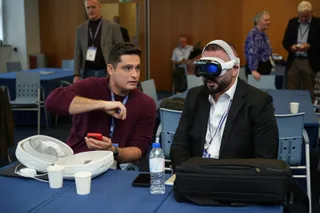See, feel, train – new HandsOn.surgery virtual surgical simulator
Contact Our Team
For more information about how Halldale can add value to your marketing and promotional campaigns or to discuss event exhibitor and sponsorship opportunities, contact our team to find out more
The Americas -
holly.foster@halldale.com
Rest of World -
jeremy@halldale.com

Researchers from the Fraunhofer Institute for Integrated Circuits IIS unveiled the prototype of a virtual surgery trainer at MEDICA 2018 in November. “HandsOn.surgery” helps surgeons prepare for individual patient cases prior to surgery, and enables them to practice the surgery.
Both the surgical placement of implantable hearing aids and the surgical treatment of tumor diseases require milling the petrosal bone. Operations on the petrosal bone are both challenging and risky for any surgeon, as the facial nerve runs through the bone there, concealed, and the tight access offers a particularly limited surgical view.
Aspiring surgeons therefore need extensive training before they can routinely perform such difficult procedures. To date, training opportunities are limited to just a few specialized centers, making large-scale training impossible. The virtual surgery trainer supports physicians in their education and training and is expected to help minimize surgery time and the risk of injury.
With HandsOn.surgery, surgeons can practice individual procedures in oral and maxillofacial surgery, orthopedics and other areas before the actual operation using the patient’s digital twin – at any time, as often as they want, and with no risk.
The highly immersive HandsOn.surgery trainer enables doctors to see, feel and practice a virtual operation: because it uses real CT patient data, force feedback from the surgical instrument, intuitive touchscreen selection and a 3D monitor or VR headset, the trainer lets doctors experience the operation as if they were performing it live on the patient, including original operating room sounds.
HandsOn.surgery was created in the “HaptiVisT” project, which is being funded by the German Federal Ministry of Education and Research (BMBF) (funding code 16SV7559) from June 1, 2016 to May 31, 2019. The aim of the project is to develop and evaluate a haptic-visual learning system for surgical procedures that can be used in both urban and rural hospitals to address the widespread shortage of medical specialists.
HaptiVisT is a joint project involving Fraunhofer IIS, szenaris GmbH (project coordinator), the Clinic and Polyclinic for Ear, Nose and Throat Medicine at the University of Leipzig Medical Center, the Clinic and Polyclinic for Trauma Surgery at University Hospital Regensburg, OTH Regensburg University (Ostbayerische Technische Hochschule Regensburg), SeeFront GmbH and Haption GmbH.
To learn more about the project, visit www.iis.fraunhofer.de/HandsOn.


